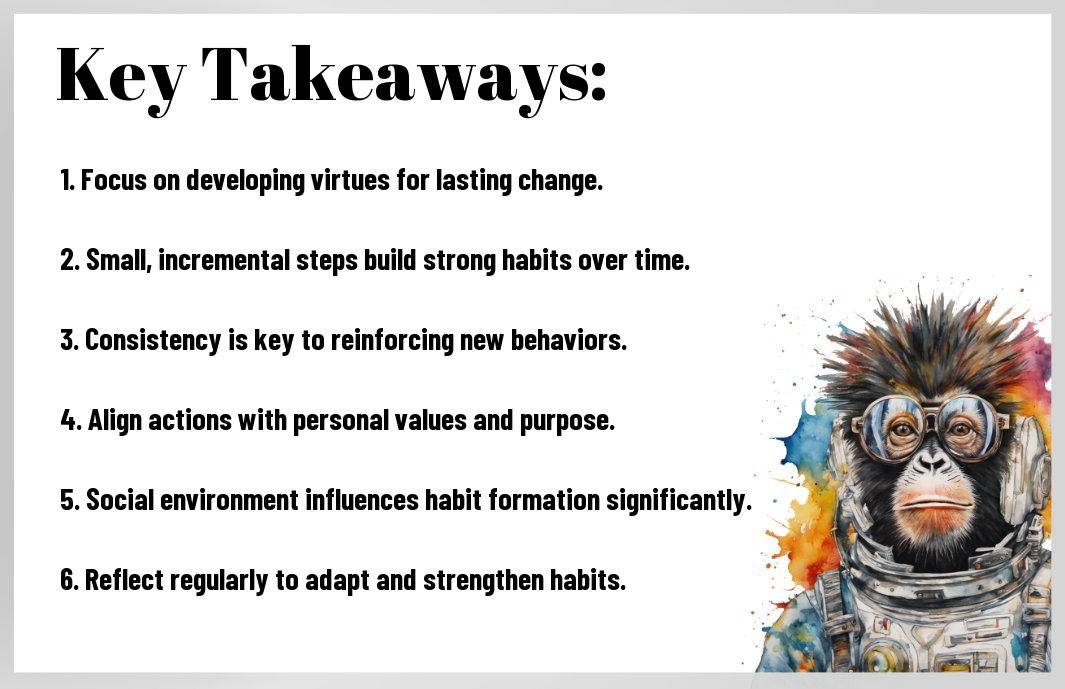
Newsletter Subscribe
Enter your email address below and subscribe to our newsletter

Enter your email address below and subscribe to our newsletter

Your journey toward creating lasting habits can draw inspiration from the philosophical insights of Aristotle. At the core of his teachings lies the belief that our actions determine our character and, ultimately, our happiness. By understanding the philosophy of habit through an Aristotelian lens, I can shape my daily routines to foster personal growth and fulfillment. This approach encourages me to focus not just on what I do, but on why I do it, ensuring that my habits align with my aspirations and values.
One of the key tenets of Aristotelian ethics is the concept of the ‘golden mean,’ which suggests that virtue lies between extremes of deficiency and excess. For instance, courage is the balance between cowardice and recklessness. By applying this moderation to my habits, I can develop a well-rounded character and make decisions that lead to a flourishing life. This ethical framework serves as a guiding principle, nudging me toward choices that not only benefit me but also contribute to the greater good.
Around this foundation, we can see that my habits aren’t just actions; they are reflections of my character and virtues. If I aspire to be generous, practicing the habit of giving, no matter how small, builds this virtue over time. Likewise, I can cultivate resilience by addressing challenges consistently. Aristotle believed that virtues are formed through repetitive actions, which means that each time I choose to act virtuous, I strengthen my character. This chain creates a reciprocal relationship where my evolving character further influences the formation of my habits.
Hence, it becomes apparent that the importance of virtue and character cannot be overstated in the context of habit formation. By actively choosing to embody virtues through my daily actions, I begin on a transformative journey. Each small decision reinforces my character and aligns my habits with my deepest values. This interconnectedness is what makes the Aristotelian approach compelling and applicable to our modern lives, helping me create habits that are not only lasting but also meaningful.


Even though many of us understand the importance of forming good habits, it’s fascinating to investigate into the science behind how these habits are created in our brains. Understanding this process can empower you to take control of your habits and make lasting changes in your life. Our brains are wired to create neural pathways that help us perform tasks efficiently. When you engage in a specific behavior repeatedly, your brain begins to recognize it as a routine, making it easier for you to carry out the action without much thought. This means that our habits are not just choices; they’re neurological shortcuts your brain has developed over time.
Before forming a habit, there’s often a trigger or cue that signals your brain to initiate a specific routine. This could be anything from a time of day to an emotional state, acting as a prompt for your behavior. Once you respond to that trigger and complete the action, the behavior is rewarded, often with a sense of accomplishment or pleasure. This cycle of cue, routine, and reward solidifies the habit in your neural pathways, making it increasingly automatic with practice. As you continue this cycle, the connections in your brain strengthen, solidifying the new behavior as a part of your daily life.
Against the backdrop of our fast-paced lives, the significance of repetition and consistency stands out in forming lasting habits. Repeating an action reinforces the neurological pathways associated with it, making it easier to perform over time. Consistency is like the glue that holds your habit together, allowing it to flourish. When you commit to practicing your new behavior regularly, you’re necessaryly teaching your brain that this action is important, encouraging it to prioritize in future decision-making. Eventually, these repeated actions become so ingrained that they require minimal conscious thought, freeing you up to focus on other aspects of your life.
The journey of establishing habits is a beautiful dance between your brain and your actions. By recognizing the power of repetition and staying committed to your new habits, you’ll find that even the most daunting behaviors can become seamless parts of your daily routine. Each time you choose to stick to your goals, you’re not just changing your behavior; you’re rewiring your brain for success.
Now that we’ve explored the significance of intention in creating lasting habits, let’s probe deeper into how we can set our intentions through an Aristotelian lens. At its core, Aristotle posits that living a virtuous life involves a clear understanding of one’s purpose. This purpose not only guides our actions but also shapes our character. When I start setting intentions, I first ask myself: what truly matters to me? I consider my values, passions, and what brings me fulfillment. This self-reflection is the foundation of my journey toward meaningful habits.
With purpose defined, I can align my intentions with my daily actions. It’s all about distilling what I want to achieve into specific, actionable goals. I find it helpful to articulate my purpose in a sentence or two; doing this helps me remain focused and motivated. For example, if my purpose revolves around personal growth, my intentions could involve daily reading or engaging in insightful conversations. The clearer I am about my purpose, the more effectively I can approach my goals with intent.
Behind every action I take lies a core value that fuels my motivation. Aligning my actions with my values means evaluating how each choice I make either brings me closer to or farther away from my purpose. If I value health, for instance, I’m more likely to choose nutritious meals, regular exercise, and mindfulness practices. When I consciously connect my daily actions with what I value most, it reinforces my intentions and strengthens my resolve.
It’s fascinating to observe how aligning actions with values creates a ripple effect in my life. When my everyday choices reflect my core beliefs, I start to naturally develop habits that resonate with my purpose. I notice that the choices I make are not just routine; they become part of who I am. This alignment fosters a sense of authenticity and fulfillment—each small action feels significant and drives me closer to my larger life goals. As I continue this journey, I become more aware of how empowering it is to live intentionally, embracing the essence of what Aristotle believed about purposeful living.

Once again, I want to emphasize the importance of taking small, manageable steps when cultivating lasting habits. It’s easy to feel overwhelmed by the grand vision of where we want to be, but breaking it down into bite-sized pieces makes the journey much more accessible. Each small step you take creates a sense of accomplishment, which in turn fuels your motivation to continue. It’s like stacking bricks; as you consistently add one to the top of another, you begin to see how a solid structure forms over time. These small actions often lay the foundation for habits that stick, because they’re not daunting, allowing you to integrate them seamlessly into your routine.
Among the many philosophies that resonate with me, the principle of Kaizen stands out as a guide to continuous improvement through small, incremental changes. Originating from Japan, Kaizen is all about making tiny adjustments that lead to substantial outcomes over time. For instance, if you want to establish a habit of reading, start with just five minutes a day instead of aiming for an hour right off the bat. This approach makes the new habit feel less intrusive, and before you know it, you might find yourself engrossed in books for much longer than you ever expected. The beauty of Kaizen is that it prioritizes progress over perfection.
Against the backdrop of our fast-paced world, it can be easy to overlook our achievements, focusing instead on what we haven’t yet accomplished. I’ve found that recognizing even the smallest victories along the way can make all the difference in maintaining my motivation. When you celebrate progress, you shift your mindset from a place of lack to one of abundance. For example, if your goal is to exercise more, acknowledging the fact that you went for a short walk today is a victory worth celebrating, even if it’s not a full workout. This gentle encouragement nurtures your sense of self-worth and dedication to your goals.
To truly embrace the idea of celebrating progress, I encourage you to set up a system for acknowledging your achievements, no matter how small. It could be as simple as keeping a journal where you jot down your daily wins or sharing your milestones with friends who support you. By focusing on what you’ve completed, you reinforce the positive emotions associated with your journey, making it easier to stay committed and enthusiastic about your growth. Emphasizing your progress, rather than fixating on perfection, can keep your spirits high and your habits thriving.
Many of us encounter roadblocks on our path to creating lasting habits. It can be frustrating when you’ve set your mind on a new routine, only to find unexpected challenges standing in your way. These obstacles may range from external factors, like a hectic schedule or lack of resources, to internal struggles, such as fear of failure or self-doubt. Identifying these roadblocks is the first step in tackling them effectively. When I took the time to assess what was holding me back, I realized that acknowledging these challenges helped me feel more empowered to find solutions and make adjustments along the way.
Before I could work on my habits, I needed to determine what was getting in my way. Some of the common roadblocks I discovered included procrastination, overwhelming feelings of inadequacy, and even perfectionism. Taking a moment to write down these challenges allowed me to visualize my obstacles and strategize how to approach them. By dissecting these hurdles, I could focus my energy on overcoming them rather than feeling trapped or hindered by their presence.
At this point, I had to shift my focus to building resilience against the obstacles I identified. One effective strategy I found was to break my larger goals into smaller, manageable tasks. This approach minimizes the feeling of being overwhelmed and allows you to celebrate small victories along the way, boosting your motivation. Additionally, surrounding myself with a supportive community and seeking encouragement from friends or online groups helped reinforce my commitment to my habits. It’s amazing how an uplifting word or shared experience can give you the strength to keep pushing forward.
Also, I discovered the importance of self-compassion in my journey. Rather than harshly criticizing myself for any missteps, I chose to view setbacks as opportunities to learn and grow. This shift in mindset made a significant difference, allowing me to bounce back more easily and maintain a positive outlook despite the hurdles. Incorporating a few simple practices, like mindfulness or journaling, helped me stay centered, reminding me that I am building habits for my long-term well-being. With these strategies in place, I began to embrace the journey rather than just focus on the destination.
All of us know that creating lasting habits can sometimes feel like a solitary endeavor. Yet, I believe that having the right community can make all the difference in our journey towards personal growth. Support systems not only provide motivation but also foster a sense of belonging that can help you stay committed to your habits. When I think about the times I faced challenges in sticking to a goal, it was the encouragement and insight from friends or groups that helped me push through the rough patches. Connecting with others who share similar aspirations can set the stage for accountability and success.
After many attempts at forming new habits, I’ve come to appreciate the power of having a solid support system. Whether it’s friends, family, or even colleagues, surrounding myself with positive influences can inspire me to reach my goals. When I share my goals with others, their encouragement often gives me the motivation to keep going, especially on days when I might feel discouraged. Knowing that someone cares about my progress makes me feel more accountable and less alone in my journey.
Any habit can flourish when you find your “habit tribe”—a group of like-minded individuals who share your passions and aspirations. I’ve realized that connecting with others who are on similar journeys not only offers moral support but also invites the exchange of ideas and strategies that can elevate my own habit-forming efforts. Engaging in this kind of community helps both of us to learn from each other’s experiences, fostering a deeper commitment to our respective goals.
Even the journey to finding your habit tribe can be rewarding. Attend local meetups, engage in online forums, or simply reach out to friends who share your interests. The beauty of it lies in discovering people who resonate with your experiences and ambitions, creating an environment where you can celebrate successes and navigate setbacks together. Once you build that network, you’ll see how effortlessly motivation and accountability start to flow, making the process of creating lasting habits not only achievable but enjoyable too.
Not all measurements of progress are created equal, and finding the right way to track your journey can help illuminate the path toward lasting habits. I often find that measuring progress isn’t just about the big milestones, but also about the little victories that feel satisfying and motivating. One technique I use regularly is keeping a habit journal, which serves as a personal record of my achievements and challenges. It’s not just about writing what I did each day; it’s also an opportunity to reflect on how I felt during the process, which makes my journey much more insightful and personalized.
Below, I’ll share how I approach keeping a habit journal to track my progress. I start by jotting down the specific habits I’m working on, along with a timeline for when I’d like to achieve certain benchmarks. Each day, I take a few minutes to write about what went well and what didn’t, and I often include a few encouraging words to lift my spirits on tougher days. This practice not only helps me to hold myself accountable, but it gives me a space to celebrate growth, even if it’s just a little bit at a time. I’ve found that looking back at past entries reveals patterns and insights I might have overlooked in the moment.
One of the joys of keeping a habit journal is the opportunity for reflection. As I flip through the pages, I begin to notice trends in my successes and areas where I need to pivot. This process has shown me that growth is rarely linear and that adjusting my approach based on what I’ve learned can lead to even greater success. I often set aside time each week or month to review my entries and actively think about how I can adapt my methods to stay on track. This reflection period helps me check in with my goals and fine-tune my strategies moving forward.
Consequently, this reflective practice aids my personal development by encouraging me to stay connected with my goals and understand my journey better. When I see progress or recognize the need for adjustments, I can make informed decisions about how to adjust my habits. This way, I’m not just going through the motions; I’m consciously evolving in my pursuit of creating lasting habits that align with my values and aspirations.
A: The Aristotelian approach emphasizes finding one’s purpose and virtue. Aristotle believed that habits stem from our character and contribute to our overall happiness. By aligning our daily actions with our values and cultivating virtuous habits, we can create lasting changes in our lives.
A: Start by reflecting on your values and goals. Consider what habits align with your vision of a fulfilling life. Write down the changes you wish to see in your routine and evaluate how each potential habit supports your overall purpose. This reflection helps you prioritize the habits that are most significant for you.
A: Yes, the process typically includes several steps:
1. Self-reflection: Understand who you are and what you value.
2. Goal setting: Define clear and achievable goals that resonate with your values.
3. Small increments: Break down your desired habit into manageable actions.
4. Consistency: Make a commitment to practice your new habit regularly.
5. Re-evaluation: Periodically assess your progress and adjust your strategies as needed.
A: Virtue acts as the guiding principle in establishing habits. Aristotle proposed that habits derived from virtuous actions lead to a more meaningful and fulfilling existence. By integrating virtues such as honesty, courage, and moderation into your daily practices, your habits will not only become more sustainable but will also contribute positively to your character development.
A: Absolutely! The Aristotelian model can be just as effective for breaking bad habits. Begin by identifying the virtues you wish to embody and the negative habits that conflict with them. Focus on replacing undesirable actions with positive, virtuous alternatives. This strategy encourages growth and transformation rather than solely highlighting the negative aspects of the habits you want to change.
A: Maintaining motivation can be enhanced through the use of positive reinforcement and accountability. Engage with a community or find an accountability partner who shares similar goals. Track your progress and celebrate small victories to foster a sense of achievement that propels you forward. Connecting your habits back to your core values can also reignite your motivation during challenging times.
A: Slips are a natural part of any habit formation journey. Instead of viewing them as failures, see them as opportunities for growth. Analyze what led to the slip and reflect on how to adjust your approach moving forward. The key is to maintain a perspective of self-compassion and resilience, focusing on the long-term vision rather than a single setback.